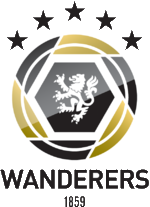FA CUP 1871-72
Winners: Wanderers Runners-up: Royal Engineers
Match Summary As was common at the time, both teams focused mainly on attack rather than defence, the Engineers lining up with seven forwards and Wanderers with eight. Wanderers forward Morton Betts played under the pseudonym "A. H. Chequer", derived from his membership of the Harrow Chequers club. Some sources state that he played under an assumed name to disguise the fact that he was cup-tied, having been a registered player of the Chequers club at the start of the competition and therefore ineligible to play for another club in that season's cup. This, however, is unlikely to be true, as in the early amateur era of football players were not required to be formally registered with clubs. Cuthbert Ottaway, a future captain of the England national team, played for two different clubs in consecutive rounds of the 1871–72 FA Cup without incident.
Wanderers captain C. W. Alcock won the coin toss and chose to defend the Harleyford Road end of the ground, meaning that the Engineers, who were considered the favourites at the start of play, initially had the sun and wind in their faces.
Early in the game, Edmund Creswell of the Royal Engineers suffered a broken collar bone in a melee. He refused to leave the pitch but due to his injury was forced to spend the remainder of the match as a "passenger" on the wing. Wanderers' tactics centred on the dribbling skills of individual players, while the Engineers favoured passing the ball, a style then known as the "Combination Game" and considered innovative, of which they were leading exponents.
Wanderers took the lead fifteen minutes into the game when Betts opened the scoring from an acute angle after Robert Vidal's long dribble. Under the rules in use at the time, the teams changed ends after each goal, but the Engineers were unable to take advantage of the fact that the sun and wind were now behind them, and the Wanderers players remained dominant.
After twenty minutes Alcock put the ball past the Engineers' goalkeeper, William Merriman, but the goal was disallowed because Charles Wollaston had handled the ball. Wanderers continued to exert further pressure on the Engineers' goal and only Merriman's skill was able to prevent them from increasing their lead. One newspaper later described his performance as "perfect". Despite a late rally from the Engineers, Wanderers were able to hold on to their lead and the game ended in a 1–0 victory. Newspaper The Field called the final "the fastest and hardest match that has ever been seen at The Oval" and said that the Wanderers displayed "some of the best play, individually and collectively, that has ever been shown in an Association game".
Post Match The Cup was presented by the President of the Football Association, Mr E. C. Morley, at the annual dinner of the Wanderers at the Pall Mall Restaurant, Charing Cross, on 11 April.
The Football Association also gave each player in the winning team a silk badge commemorating the victory and the Wanderers' committee presented each player with an inscribed gold medal. As cup-holders, Wanderers received a bye straight to the final of the following year's FA Cup, in keeping with the original concept of the competition being a "challenge cup". This was the only time this rule was used.
In 1938, The Times published an obituary for Thomas Hooman and stated that he had scored the winning goal in the 1872 cup final, citing an interview the player gave shortly before his death. This claim is not backed up by contemporary newspaper reports, all of which list Betts as the goalscorer, and, as other quoted aspects of Hooman's reminiscences about the match were incorrect, it seems that in his old age he was confusing the 1872 final with another match in which he played.
In 2010, the only known surviving medal from the final was offered for sale at an auction in London. It had been purchased by a jeweller as part of a house clearance in the 1950s and was expected to sell for up to £50,000, but was ultimately purchased by the Professional Footballers' Association for £70,500.
| |||||||||||||||||||||||||||||||||||||||||||||||||||||||||||||||||||||||||||||||||||||||||||||||||||||||||||||||||||||||||||||||||||||||||||||||||||||||||||||||||||||||||||||||||||||||||||||||||||||||||||||||||||||||||||||||||||||||||||||||||||||||||||||||||||||||||||||||||||||||||||||||||||||||||||||







